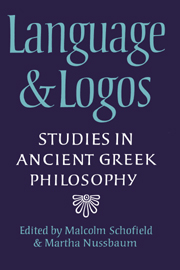Book contents
- Frontmatter
- Contents
- Preface
- Introduction
- 1 Heraclitus' conceptions of flux, fire and material persistence
- 2 Epistemology and meaning in Heraclitus
- 3 The dénouement of the Cratylus
- 4 Cratylus' theory of names and its refutation
- 5 Knowledge and language: the Theaetetus and the Cratylus
- 6 Falsehood and not-being in Plato's Sophist
- 7 Forms and dialectic in the second half of the Parmenides
- 8 Aristotle and the more accurate arguments
- 9 Aristotle on the principles of change in Physics I
- 10 Aristotle on natural teleology
- 11 Accidental unities
- 12 Aristotle's concept of signification
- 13 Saving Aristotle's appearances
- 14 Myths about non-propositional thought
- 15 Gods and heaps
- Bibliography of the publications of G. E. L. Owen
- Index locorum
- Index of names
3 - The dénouement of the Cratylus
Published online by Cambridge University Press: 09 October 2009
- Frontmatter
- Contents
- Preface
- Introduction
- 1 Heraclitus' conceptions of flux, fire and material persistence
- 2 Epistemology and meaning in Heraclitus
- 3 The dénouement of the Cratylus
- 4 Cratylus' theory of names and its refutation
- 5 Knowledge and language: the Theaetetus and the Cratylus
- 6 Falsehood and not-being in Plato's Sophist
- 7 Forms and dialectic in the second half of the Parmenides
- 8 Aristotle and the more accurate arguments
- 9 Aristotle on the principles of change in Physics I
- 10 Aristotle on natural teleology
- 11 Accidental unities
- 12 Aristotle's concept of signification
- 13 Saving Aristotle's appearances
- 14 Myths about non-propositional thought
- 15 Gods and heaps
- Bibliography of the publications of G. E. L. Owen
- Index locorum
- Index of names
Summary
In his published writings Gwil Owen has from time to time given us some characteristically stimulating comments on the Cratylus. Although he has not devoted an entire essay to the dialogue, it has often been among his favourite topics of discussion. I recall in particular a seminar which he conducted on it soon after his arrival in Cambridge in 1973. I hope he may enjoy this further contribution to the conversation.
The progress of the main argument of the Cratylus is clear enough, although not always well understood. Socrates in conversation with Hermogenes propounds a theory according to which a name (i.e. a noun, a verb, or an adjective – but not a word of primarily syntactic function) counts as a genuine or correct name if and only if its nominatum is a real thing and its constitution is naturally suited to its nominatum. The principal test of a name's suitability is its capacity to teach or disclose to us the nature or essence of its nominatum: simply by considering the constitution of a name we should be able to tell what it is the name of (386D–391A).
Socrates then attempts to explain just how a name could be so constituted as to disclose its nominatum. He does so by means of the hypothesis that his own language, Greek, consists of genuine names in the sense required by the theory.
The account he offers of the way in which Greek names can be construed as genuine names is developed in two stages.
- Type
- Chapter
- Information
- Language and LogosStudies in Ancient Greek Philosophy Presented to G. E. L. Owen, pp. 61 - 82Publisher: Cambridge University PressPrint publication year: 1982
- 11
- Cited by



